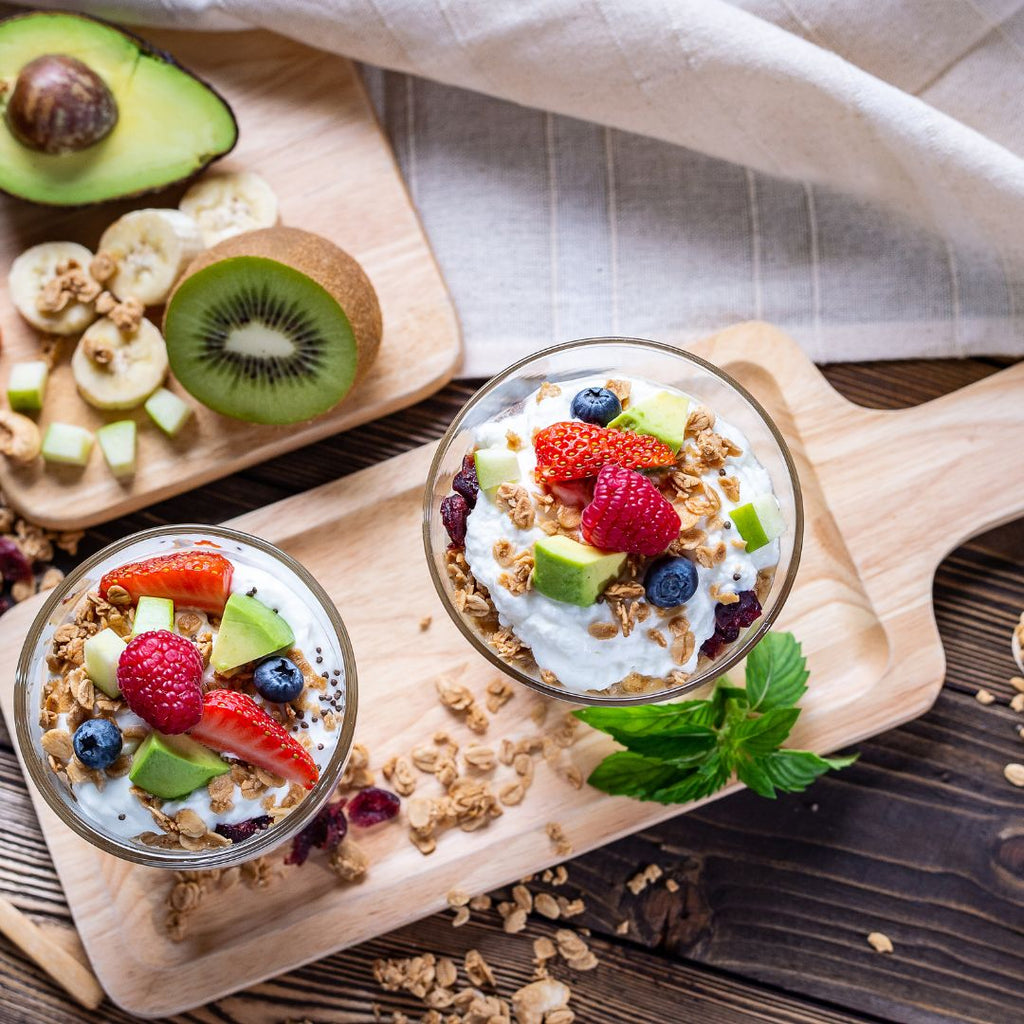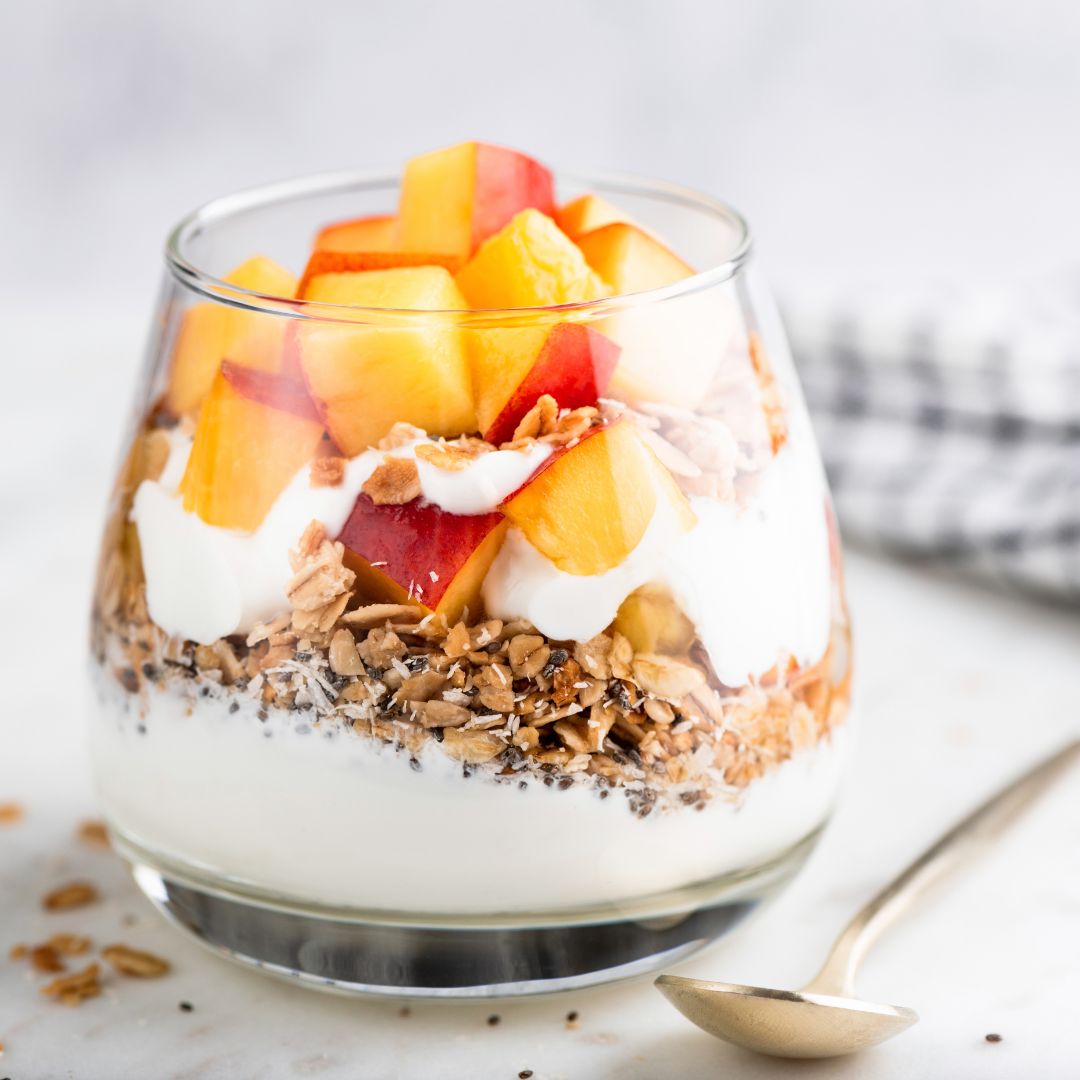Oh, the joy of savoring Greek yogurt, especially when it's generously topped with juicy blueberries and raspberries, and a sprinkling of nuts for that satisfying crunch.
Yum!
But did you know that the deliciousness of Greek yogurt is only part of the story? Its rise to fame began around 2009, and since then, Greek yogurt has been more than just a tasty treat for many Americans.
But there's more beneath that creamy surface.
Does Greek yogurt have probiotics? Is it rich in calcium for bone health? And what about that protein and sugar content?
In this article, we'll dig into the health benefits of Greek yogurt and uncover some surprising facts about this delicious dairy product.
So, What Makes Greek Yogurt... Greek?
This yummy delight traces its origins back to Greece, (we know, shocker, right?). It's not just a name, it's a legacy. The Greeks have been enjoying this creamy wonder for over 7000 years.
Well, Greek yogurt is essentially just like regular yogurt, but with a twist.
Imagine this: You start with the same step as making regular yogurt - heating milk. You then add two live bacterial cultures, Lactobacillus bulgaricus and Streptococcus thermophilus. These guys get to work, fermenting the lactose sugar in the milk and turning it into lactic acid. This fermentation process thickens the milk and gives it that tangy flavor we all know and love. But here's the game-changer: the yogurt is then strained multiple times to remove the liquid whey, resulting in a thicker, creamier product. And voilà, you have Greek yogurt!
Nutritional Profile
Let's swap our spoons for microscopes and dive into the nutritional landscape of Greek yogurt thanks to some stats from the US Department of Agriculture Food Data Central:
A Mouthful of Macros
Macronutrients are the components of our diet that provide energy - carbs, proteins, and fats. Their molecular structure is larger and determines their role in our bodies. So, what are these macronutrients doing in Greek yogurt?
1. Packed with Protein
Greek yogurt serves up a hefty dose of protein, with around 9 grams per serving. That's twice the protein found in regular yogurt. Protein is crucial for muscle repair and growth, making this a great post-workout snack.
2. Cutting Down on Carbs
When it comes to carbohydrates, Greek yogurt has less than half the carbs of regular yogurt. This is due to the straining process which removes excess whey, reducing the sugar and carbohydrate content. An average serving contains around 4 grams of carbohydrates.
3. Friendly Fats
While non-fat versions are available, traditional Greek yogurt contains about 5 grams of fat per serving. Fats are helpful in the absorption of fat-soluble vitamins (A, D, E, K), so those blueberries are now even better for you!
Tidbits of Micros
Micronutrients are the vitamins and minerals our body needs in smaller amounts but also play essential roles in our bodies.
1. Champion of Calcium
Bone health, here we come! Greek yogurt is a calcium powerhouse, containing around 100 mg per serving, which is 20% of the recommended daily intake.
2. Powerhouse of Phosphorus
It's not just about calcium when we talk about bone health. Phosphorus plays a vital role too, contributing to the formation and maintenance of bones and teeth. Greek yogurt offers roughly 135 mg of phosphorus per serving, making it a rich source of this essential mineral.
3. Packed with Potassium
Say hello to heart health with potassium, a critical nutrient that helps regulate heart rhythm and blood pressure. A serving of Greek yogurt provides approximately 141 mg of potassium, adding yet another reason to include this nutritious dairy product in your diet.
Gut Health: Does Greek Yogurt Have Probiotics?
Probiotics in Greek yogurt, like our little friends Lactobacillus bulgaricus and Streptococcus thermophilus, work to improve your gut health, fighting off harmful bacteria and keeping the peace among the millions of microorganisms living there. They maintain balance in this bustling bacterial metropolis by crowding out the bad guys, ensuring that the friendly bacteria remain in control.
This gut-healthy activity has a domino effect that results in smoother digestion. By keeping your gut in check, probiotics aid in breaking down food and absorbing nutrients effectively. They can even help relieve common digestive issues. For instance, lactose-intolerant folks often find they can enjoy Greek yogurt without trouble, thanks to these live cultures that help digest lactose.
Don't just take our word for it, there's science to back it up! A study published in the Journal of Nutrition Reviews found that consuming probiotics via fermented foods like Greek yogurt can improve lactose digestion.
But, let's not forget to pop the Greek yogurt hype bubble just a tad. While it does contain live bacteria, they aren't encapsulated to survive the perilous journey through our gut's acidic environment. So, not all of these probiotics may reach their intended destination to perform their gut-balancing act. However, with regular consumption, you're likely to keep sending enough troops down there to make a positive impact on your gut health.
Kids Belly-Biotic: The Ultimate 3-in-1 Probiotic Gummy

As parents, we often face the challenge of picky eaters. We want our kids to get the benefits of probiotics, and while Greek yogurt is more palatable than something like sauerkraut, it might still not be a favorite for picky eaters. Worse yet, the flavored varieties kids usually reach for can be loaded with artificial sugar. But worry not, our Kids Belly-Biotic is your handy ally in this nutritional tug-of-war.
Our Kids Belly-Biotic is a triple threat in the world of gut health, thanks to its 3-in-1 combo of prebiotics, probiotics, and postbiotics. Prebiotics are the hardworking ground crew, laying down the perfect conditions for probiotics, the friendly bacteria, to flourish. Postbiotics result from this dynamic duo's work, acting as the peacekeepers, ensuring the gut environment remains in a healthy, balanced state. This bustling gut microbiome plays a starring role in your child's well-being.
This is because a healthy gut doesn't just mean fewer tummy troubles. It's like a whole command center for health, with far-reaching impacts that may surprise you.
So, why not give them a helping hand with our Kids Belly-Biotic? With regular use, you're setting the stage for your child's health today and well into the future.
Discover The Power Of Our Kids Belly-Biotic Today!
Weight Management
Now, that we have answered the burning question of,” Does Greek yogurt have probiotics?”, let’s explore another great benefit of indulging in Greek yogurt - its role in weight management. One of the key players in weight management is satiety, or the feeling of being full.
Protein's Starring Role
Protein is the star of the show when it comes to satiety. According to a study published in the American Journal of Clinical Nutrition, protein-rich foods assist in promoting the feeling of fullness. They do this by reducing the levels of ghrelin, a hormone that stimulates hunger. So, with Greek yogurt's hefty protein content, you're not just feeding your muscles post-workout, you're also helping manage your appetite!
Taming the Crave Wave
The role of Greek yogurt doesn't end with just providing protein. The 'full' feeling it delivers can also help in managing cravings. When your stomach is satisfied, you're less likely to reach for unhealthy snacks. Plus, the natural sweetness in Greek yogurt can help satiate sweet cravings more healthily. But, be mindful of the flavored versions which can be high in added sugars. Stick with the plain variety and add fresh fruits for natural sweetness if needed.
Bone Health
So, we've talked about the probiotics and protein in Greek yogurt, but let's take a look at what it can do for your bones. Spoiler alert: It's more than just being packed with calcium!
Osteoporosis: The Silent Thief
Low levels of calcium play a significant role in the development of osteoporosis, the silent thief. Calcium, in addition to Vitamin D2 and D3, is the crucial building block of bone tissue and bone density. When your body is starved of calcium, it starts to steal it from your bones, leading to a decrease in bone density and making them brittle. In layman's terms, your bones start to look like Swiss cheese - full of holes and not very sturdy. This can lead to fractures and nobody wants that!
Greek Yogurt: The Bone Protector
Enter Greek yogurt. As we've already discussed, Greek yogurt is a champion of calcium, offering around 100 mg around 10% of your daily intake in a single serving. But it doesn't stop there. With its probiotics, Greek yogurt can significantly enhance calcium absorption in the body, which makes the calcium in Greek yogurt even more efficient for our bodies.
So, by regularly dolloping Greek yogurt onto your whole grain cereal, you're not just gaining a tasty breakfast but also arming your body with the calcium it needs to keep your bones robust and healthy. Remember, Greek yogurt is like a calcium delivery service - it doesn't just provide the goods, it makes sure they reach the right destination.
Muscle Magic with High-Quality Protein

Another arena where Greek yogurt truly flexes its muscles - quite literally!- is muscle growth. Proteins are the building blocks of muscles, and Greek yogurt is stocked with it. Proteins are extremely beneficial for muscle synthesis and repair. So, each spoonful of Greek yogurt is not just a creamy delight; it's also a muscle-building pal - especially after a grueling workout. The previously mentioned study also concluded that eating protein within 1 hour of a workout can promote muscle growth and repair. So, in addition to supercharging your fitness with vitamins, Greek yogurt is an excellent post-workout snack to kickstart your muscle recovery.
Immunity & Allergies
By now, you have gathered that not all bacteria are bad guys. You are now well-acquainted with our friendly neighborhood bacteria, probiotics, and the many benefits they offer for gut health, weight management, and bone and muscle health. But what you may not know is that probiotics are also skilled at boosting our immune systems and warding off allergies.
The research found that these friendly bacteria boost our immune system's response to diseases, making it more efficient in warding off infections. Therefore, the probiotics in Greek yogurt aren't just keeping your gut happy; they're also upgrading your body's defense system!
Also, have you ever heard of the anti-inflammatory properties of probiotics? Well, a study found that probiotics can help reduce inflammation, which is at the root of many allergies. This is because of its strong antioxidant properties, which can help keep allergies at bay. So, if you want to reduce the risk of developing seasonal allergies or trying to combat existing ones, adding Greek yogurt to your diet may be a delicious solution!
So, Does Greek Yogurt Have Probiotics?
The answer is a hearty yes! Greek yogurt is a probiotic powerhouse. These friendly bacteria are not just surviving but thriving in Greek yogurt. They're ready to jump into action the moment they hit your gut, supporting digestion, aiding in nutrient absorption, and keeping those pesky bad bacteria in check.
But hey, let's not forget about our little ones. Kids need their dose of 'friendly bugs' too, right? That’s where our Kids' Belly-Biotic comes into play! Crafted with care, this specially designed probiotic supplement bolsters your child's gut health, aids digestion, and supports their growing immune system while having a great taste without loads of artificial sugar.
So why wait?
Give your kids the health-boosting power of Kids Belly-Biotic and watch them grow strong, happy, and healthy.
Discover The Power Of Our Kids Belly-Biotic Today!
References:
ABC News. (2019). Charting Greek Yogurt’s Amazing Rise. ABC News. https://abcnews.go.com/blogs/lifestyle/2014/01/charting-greek-yogurts-amazing-rise
Greek yogurt. (2021, October). Greece Is. https://www.greece-is.com/greek-yogurt-good/
Lactobacillus Delbrueckii Subsp. Bulgaricus - an overview | ScienceDirect Topics. (n.d.). Www.sciencedirect.com. https://www.sciencedirect.com/topics/medicine-and-dentistry/lactobacillus-delbrueckii-subsp-bulgaricus
Streptococcus thermophilus - an overview | ScienceDirect Topics. (n.d.). Www.sciencedirect.com. https://www.sciencedirect.com/topics/medicine-and-dentistry/streptococcus-thermophilus
FoodData Central. (2020). Usda.gov. https://fdc.nal.usda.gov/fdc-app.html#/food-details/171304/nutrients
Cintineo, H. P., Arent, M. A., Antonio, J., & Arent, S. M. (2018). Effects of Protein Supplementation on Performance and Recovery in Resistance and Endurance Training. Frontiers in Nutrition, 5(83). https://doi.org/10.3389/fnut.2018.00083
Fat Soluble Vitamins - an overview | ScienceDirect Topics. (n.d.). Www.sciencedirect.com. https://www.sciencedirect.com/topics/agricultural-and-biological-sciences/fat-soluble-vitamins#:~:text=Fat%2Dsoluble%20vitamins%20are%20absorbed
Savaiano, D. A., & Hutkins, R. W. (2020). Yogurt, cultured fermented milk, and health: a systematic review. Nutrition Reviews, 79(5), 599–614. https://doi.org/10.1093/nutrit/nuaa013
Lejeune, M. P., Westerterp, K. R., Adam, T. C., Luscombe-Marsh, N. D., & Westerterp-Plantenga, M. S. (2006). Ghrelin and glucagon-like peptide 1 concentrations, 24-h satiety, and energy and substrate metabolism during a high-protein diet and measured in a respiration chamber. The American Journal of Clinical Nutrition, 83(1), 89–94. https://doi.org/10.1093/ajcn/83.1.89
Porter, J. L., & Varacallo, M. (2019). Osteoporosis. Nih.gov; StatPearls Publishing. https://www.ncbi.nlm.nih.gov/books/NBK441901/
National Institutes of Health . (2022, October 6). Office of Dietary Supplements - Calcium. Nih.gov. https://ods.od.nih.gov/factsheets/Calcium-HealthProfessional/
Raveschot, C., Coutte, F., Frémont, M., Vaeremans, M., Dugersuren, J., Demberel, S., Drider, D., Dhulster, P., Flahaut, C., & Cudennec, B. (2020). Probiotic Lactobacillus strains from Mongolia improve calcium transport and uptake by intestinal cells in vitro. Food Research International, 133, 109201. https://doi.org/10.1016/j.foodres.2020.109201
Cintineo, H. P., Arent, M. A., Antonio, J., & Arent, S. M. (2018). Effects of Protein Supplementation on Performance and Recovery in Resistance and Endurance Training. Frontiers in Nutrition, 5(83). https://doi.org/10.3389/fnut.2018.00083
Yan, F., & Polk, D. B. (2011). Probiotics and immune health. Current Opinion in Gastroenterology, 27(6), 496–501. https://doi.org/10.1097/mog.0b013e32834baa4d
Colletti, A., Pellizzato, M., & Cicero, A. F. (2023). The Possible Role of Probiotic Supplementation in Inflammation: A Narrative Review. Microorganisms, 11(9), 2160. https://doi.org/10.3390/microorganisms11092160




